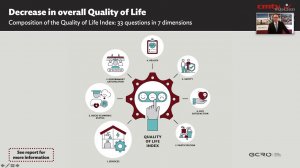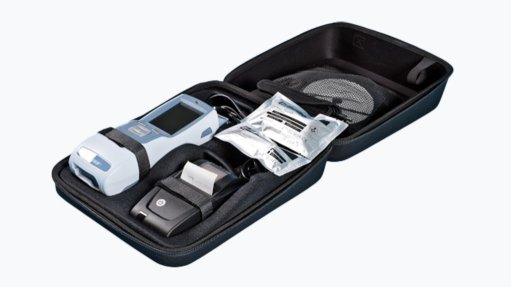Quality of life in Gauteng declines amid pandemic, survey finds

Gauteng City-Region Observatory Research Strategy director Graeme Götz outlines findings regarding the decrease of overall quality of life in the GCRO’s 2020/21 survey
Research institute the Gauteng City-Region Observatory’s (GCRO’s) Quality of Life (QoL) Survey for 2020/21 finds that the quality of life in the province decreased considerably since the previous study; however, this must be understood in the context of the pandemic.
The GCRO is a partnership between the Gauteng provincial government, the University of the Witwatersrand, the University of Johannesburg and organised local government in Gauteng.
The GCRO has run the QoL survey every two years since 2009.
The latest survey, the sixth iteration, was launched during a virtual event on September 9. The theme of this survey’s launch is the ‘Human side of the Data’.
These results provide new insight into the overall wellbeing and quality of life of residents of Gauteng in late 2020 and early 2021. The GCRO defines quality of life broadly and looks below the surface of how Gauteng residents live, to understand their experiences, perceptions and challenges.
The findings cover a range of components shaping overall quality of life, including the direct impacts of the Covid-19 pandemic, economic and psychosocial conditions, socio-political attitudes and beliefs and satisfaction with government.
It considers living conditions, socioeconomic circumstances, self-reported health and well-being, psychosocial attitudes and beliefs about and perceptions of government, service delivery and local challenges.
“There is no doubt that 2020 and 2021 will go down in the history of the world as an extraordinary period. The results of the survey reflect the mood of a city-region confronted by a new, uncertain and challenging social and economic reality brought about by the pandemic,” GCRO executive director Rashid Seedat said during the launch.
The final QoL 2020/21 dataset records the lived experiences of 13 616 of Gauteng’s residents. Seedat highlighted that this meant that it covers a wide sample range of the province’s population.
Participants were randomly sampled in each ward of the province, which includes 529 wards with at least 20 interviews in each. Data was collected by a team of dedicated fieldworkers from October 2020 to May the year.
Starting just five months after the country’s hard lockdown in March 2020, data collection spanned the second peak of Covid-19 infections early in the year and varying levels of lockdown.
The QoL 2020/21 Survey balanced questions used in previous survey iterations with new content. New content included the impact of Covid-19, social mobility and experiences of violence. The project explored the quality of life for Gauteng residents across 12 major themes.
The findings show an overall QoL Index score of 61 out of 100. This represents a substantial decline from 64 out of 100 in the previous survey, conducted in 2017/18.
Other key findings from the survey include that the economic impacts of the pandemic are extreme, with many respondents reporting a reduction in salaries and working hours, as well as job losses.
Grants and social support, however, have provided some crucial protection to the most vulnerable.
However, in general, the most advantaged have experienced the least economic fallout, while black African respondents and those with lower levels of education have been hit hardest. The pandemic appears to have driven lower-income households into poverty, the survey indicates.
Moreover, it finds that inequality between income groups remains significant, which has had considerable socioeconomic impacts. Also, the steady decrease in poverty levels over time has been reversed, which was highlighted as concerning, as several years of progress have been erased.
Moreover, in terms of the social fabric, the data shows evidence of substantial, and growing, psycho-social distress.
Levels of crime are high, and issues of safety and security are of great concern to residents. While there was some decrease in crime levels, the perception of crime levels did not decrease, it was indicated during the launch.
Residents of the province are also exposed to high levels of violence in their lives. Over half of adults report experiencing physical or sexual abuse before the age of 18.
One in five men have experienced physical violence over the past year and 5% of women have experienced intimate partner violence.
Self-reported health has worsened and a higher proportion of respondents are at high risk of depression, showing some decline in mental health.
On a more positive note, there is also evidence of a strengthening social fabric, particularly at local levels, and even growing tolerance. However, positive shifts are not evenly distributed across the population.
In terms of service delivery, the survey indicates that there is relative stability in the delivery of many basic services, and relatively high satisfaction with government’s response to Covid-19.
However, many residents feel let down, even abandoned, by government. Government satisfaction has been deeply, negatively affected.
The QoL 2020/21 data highlights an overall decrease in well-being since 2017/18. This decrease is seen across almost all of the seven dimensions of the QoL Index, with the most substantial reductions in the dimensions of governance and socioeconomic status.
While QoL Index scores have fallen for all population groups, black Africans are the only population group whose scores have fallen below 2013/14 levels.
“While we cannot demonstrate causality, our longitudinal data enable us to assess where shifts in responses have coincided with the arrival of the pandemic, and where they are a continuation of trends pre-dating the pandemic,” said Seedat.
Along with the third peak in Covid-19 infections, the violence, looting and arson that occurred in Gauteng and KwaZulu-Natal in early July took place following the completion of data collection. The impact of these events is, therefore, not reflected in the survey results.
“However, we are conscious that they will have further impacted the experiences, perceptions and beliefs of Gauteng residents,” noted Seedat.
Article Enquiry
Email Article
Save Article
Feedback
To advertise email advertising@creamermedia.co.za or click here
Comments
Press Office
Announcements
What's On
Subscribe to improve your user experience...
Option 1 (equivalent of R125 a month):
Receive a weekly copy of Creamer Media's Engineering News & Mining Weekly magazine
(print copy for those in South Africa and e-magazine for those outside of South Africa)
Receive daily email newsletters
Access to full search results
Access archive of magazine back copies
Access to Projects in Progress
Access to ONE Research Report of your choice in PDF format
Option 2 (equivalent of R375 a month):
All benefits from Option 1
PLUS
Access to Creamer Media's Research Channel Africa for ALL Research Reports, in PDF format, on various industrial and mining sectors
including Electricity; Water; Energy Transition; Hydrogen; Roads, Rail and Ports; Coal; Gold; Platinum; Battery Metals; etc.
Already a subscriber?
Forgotten your password?
Receive weekly copy of Creamer Media's Engineering News & Mining Weekly magazine (print copy for those in South Africa and e-magazine for those outside of South Africa)
➕
Recieve daily email newsletters
➕
Access to full search results
➕
Access archive of magazine back copies
➕
Access to Projects in Progress
➕
Access to ONE Research Report of your choice in PDF format
RESEARCH CHANNEL AFRICA
R4500 (equivalent of R375 a month)
SUBSCRIBEAll benefits from Option 1
➕
Access to Creamer Media's Research Channel Africa for ALL Research Reports on various industrial and mining sectors, in PDF format, including on:
Electricity
➕
Water
➕
Energy Transition
➕
Hydrogen
➕
Roads, Rail and Ports
➕
Coal
➕
Gold
➕
Platinum
➕
Battery Metals
➕
etc.
Receive all benefits from Option 1 or Option 2 delivered to numerous people at your company
➕
Multiple User names and Passwords for simultaneous log-ins
➕
Intranet integration access to all in your organisation


















